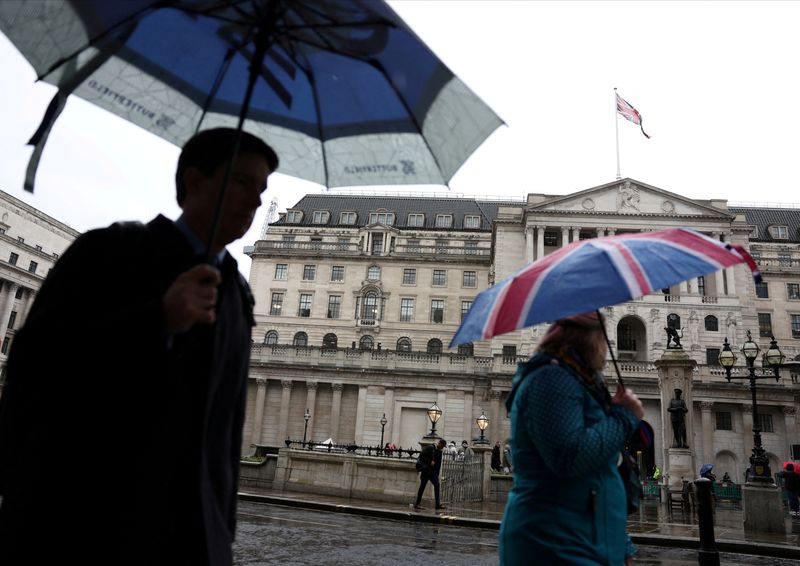By William Schomberg
LONDON (Reuters) - The Bank of England will probably keep investors guessing next week about when it is likely to start cutting interest rates as it waits for clearer signs that inflation pressures still in the economy really are being quashed.
With other central banks moving towards cutting borrowing costs for the first time since the COVID pandemic, and inflation set to fall to its 2% target soon, the BoE has put its high rates "under review".
Governor Andrew Bailey maintained the tentatively optimistic tone this week when he said inflation expectations seemed to be under control and worries about a price-wage spiral were easing.
But Bailey showed no urgency about cutting Bank Rate from a 16-year high of 5.25%, saying problems with labour market data left him unsure about the jobless rate. He also cited geopolitical risks.
"This is why it's so important to consider this question about how restrictive do we have to be, and for how long," Bailey said on Tuesday.
He and five other rate-setters voted to keep Bank Rate on hold in February, while two sought a further increase and one voted for a cut.
Analysts predict another 6-2-1 split next Thursday, resulting in a fifth consecutive "hold" decision, although inflation data on Wednesday could cause a late rethink.
The BoE expects price growth will slow to its 2% target in the second quarter after April's drop in the cost of regulated energy. But it forecasts a rise to almost 3% later in 2024.
Inflation hit a peak of 11.1% in October 2022, prompting criticism that the BoE's forecasting models had failed.
The central bank remains worried that fast-growing wages still pose a risk. Britain's minimum wage will rise by nearly 10% next month, and supermarkets and other retailers that pay staff only slightly more have raised pay in anticipation.
Employers overall have offered pay settlements of about 5% since the start of 2024. Average wage growth is about 6%, higher than about 4% in the United States and the euro zone.
Former BoE deputy governor Charlie Bean said Britain's pay growth was about double the level consistent with 2% inflation.
"I would emphasise that this episode is not over yet, and it's perhaps a little early to be declaring victory," Bean said.
BOE SEEN MOVING MORE SLOWLY
So far, calls for the BoE to move more quickly towards rate cuts have been limited.
Britain's economy seems to be emerging already from a short recession.
Finance minister Jeremy Hunt - with an eye on an election expected in 2024 - announced a second set of tax cuts in under four months last week. Analysts say that will give a moderate boost to consumers.
But with the European Central Bank debating whether to cut rates in April or June and investors expecting the U.S. Federal Reserve to move in June, the BoE may soon be lagging behind.
Economists at HSBC said they thought inflation would fall to as low as 1.2% in May and June, then pick up later in the year, potentially putting the BoE in a bind.
"While we expect the Committee largely to 'look through' this energy-driven inflation dip, it would make the communications behind a prolonged 'on hold' stance more challenging," they said.
Economists polled by Reuters mostly expect it to start cutting rates only in the third quarter, although 40% of the respondents expected a first move in the second quarter.
Investors are not fully pricing a quarter-point cut until August.
Luke Bartholomew, senior economist at fund management firm abrdn, said conflicting signals about Britain's economy meant the BoE was likely to carry on treading cautiously.

"We expect the BoE to wait until at least June before delivering the first interest rate cut as it waits for a stronger signal from the data, and for the impact of the April price and wage round to become clearer," he said.
The BoE will announce its March monetary policy decision at 1200 GMT on Thursday. There will be no press conference on this occasion as no new economic forecasts are due to be published.